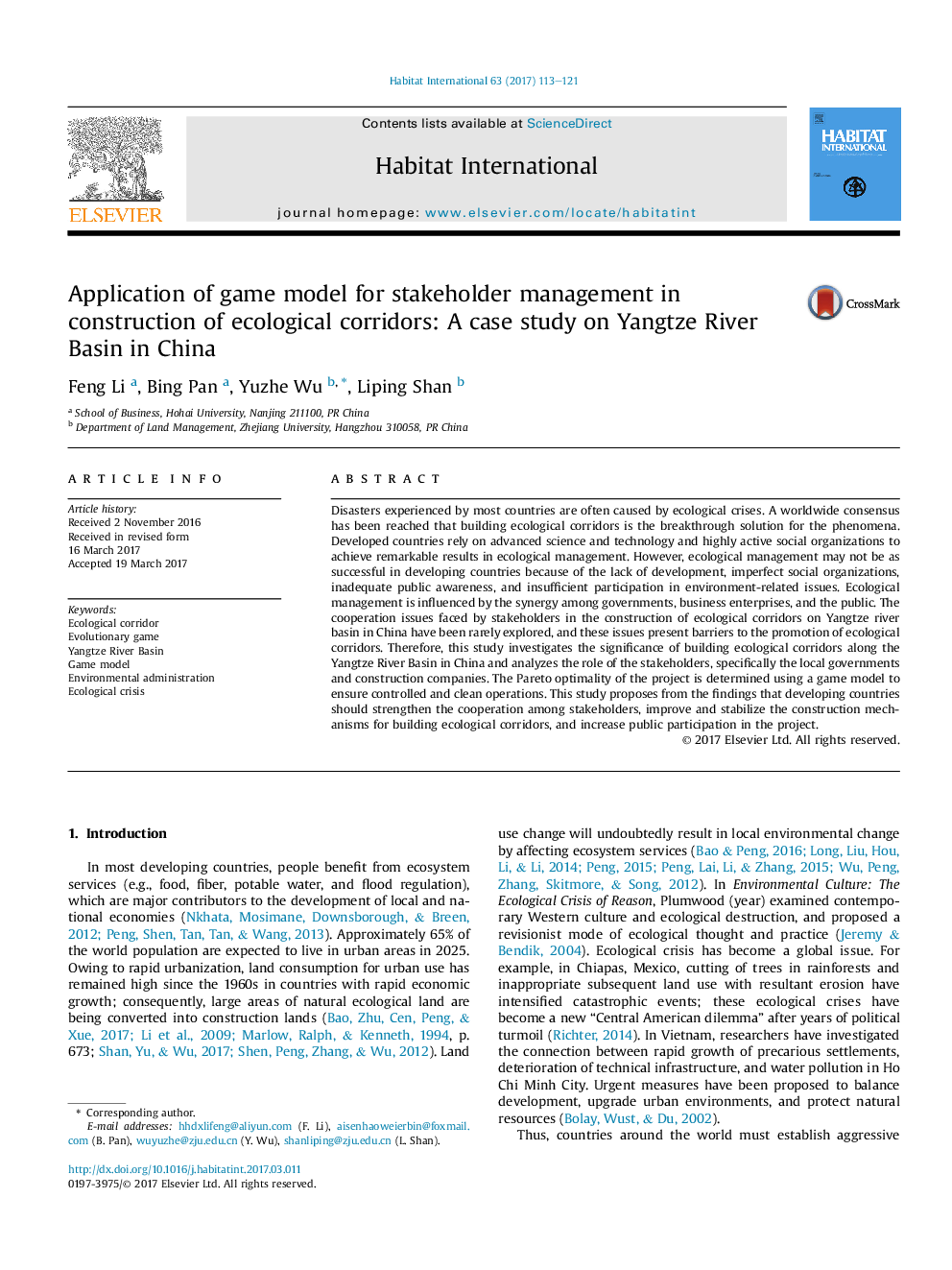| کد مقاله | کد نشریه | سال انتشار | مقاله انگلیسی | نسخه تمام متن |
|---|---|---|---|---|
| 5114659 | 1484481 | 2017 | 9 صفحه PDF | دانلود رایگان |
عنوان انگلیسی مقاله ISI
Application of game model for stakeholder management in construction of ecological corridors: A case study on Yangtze River Basin in China
ترجمه فارسی عنوان
کاربرد مدل بازی برای مدیریت ذینفعان در ساخت راهروهای زیست محیطی: مطالعه موردی حوضه رودخانه یانگ تسه در چین
دانلود مقاله + سفارش ترجمه
دانلود مقاله ISI انگلیسی
رایگان برای ایرانیان
کلمات کلیدی
راهرو اکولوژیک، بازی تکامل یافته، حوضه رودخانه یانگ تسه، مدل بازی، اداره محیط زیست، بحران زیست محیطی،
ترجمه چکیده
اغلب کشورهای دارای اغتشاشات زیست محیطی اغلب ناشی از بحران های زیست محیطی هستند. یک توافق در سراسر جهان به دست آمده است که ساختن راهروهای زیست محیطی راه حلی برای این پدیده است. کشورهای توسعه یافته به پیشرفت علم و فناوری و سازمان های اجتماعی بسیار فعال کمک می کنند تا نتایج قابل توجهی در مدیریت زیست محیطی به دست آورند. با این حال، مدیریت زیست محیطی به دلیل فقدان توسعه، سازمان های اجتماعی نامناسب، آگاهی عمومی نا معلوم و مشارکت ناکافی در مسائل مربوط به محیط زیست در کشورهای در حال توسعه موفق نخواهد بود. مدیریت زیست محیطی تحت تاثیر همکاری بین دولت ها، شرکت های تجاری و مردم قرار دارد. مسائل همکاری با ذینفعان در ساختن راهروهای زیست محیطی حوضه رودخانه یانگ تسه در چین به ندرت مورد بررسی قرار گرفته است و این مسائل موانع را برای ارتقاء راهروهای زیست محیطی مواجه است. بنابراین، این مطالعه اهمیت ساختن کریدورهای زیست محیطی در حوضه رودخانه یانگ تسه را در چین بررسی کرده و نقش ذینفعان، خصوصا دولت های دولتی و شرکت های ساخت و ساز را مورد بررسی قرار می دهد. بهینه سازی پارتو در پروژه با استفاده از یک مدل بازی برای اطمینان از عملیات کنترل شده و تمیز تعیین می شود. این مطالعه از یافته های ارائه شده مبنی بر اینکه کشورهای در حال توسعه باید همکاری میان ذینفعان را تقویت کنند، مکانیسم های ساخت و ساز برای ساختن راهروهای زیست محیطی را تقویت و تثبیت کنند و مشارکت عمومی در این پروژه را افزایش دهند، پیشنهاد می شود.
موضوعات مرتبط
علوم انسانی و اجتماعی
علوم اجتماعی
توسعه
چکیده انگلیسی
Disasters experienced by most countries are often caused by ecological crises. A worldwide consensus has been reached that building ecological corridors is the breakthrough solution for the phenomena. Developed countries rely on advanced science and technology and highly active social organizations to achieve remarkable results in ecological management. However, ecological management may not be as successful in developing countries because of the lack of development, imperfect social organizations, inadequate public awareness, and insufficient participation in environment-related issues. Ecological management is influenced by the synergy among governments, business enterprises, and the public. The cooperation issues faced by stakeholders in the construction of ecological corridors on Yangtze river basin in China have been rarely explored, and these issues present barriers to the promotion of ecological corridors. Therefore, this study investigates the significance of building ecological corridors along the Yangtze River Basin in China and analyzes the role of the stakeholders, specifically the local governments and construction companies. The Pareto optimality of the project is determined using a game model to ensure controlled and clean operations. This study proposes from the findings that developing countries should strengthen the cooperation among stakeholders, improve and stabilize the construction mechanisms for building ecological corridors, and increase public participation in the project.
ناشر
Database: Elsevier - ScienceDirect (ساینس دایرکت)
Journal: Habitat International - Volume 63, May 2017, Pages 113-121
Journal: Habitat International - Volume 63, May 2017, Pages 113-121
نویسندگان
Feng Li, Bing Pan, Yuzhe Wu, Liping Shan,
